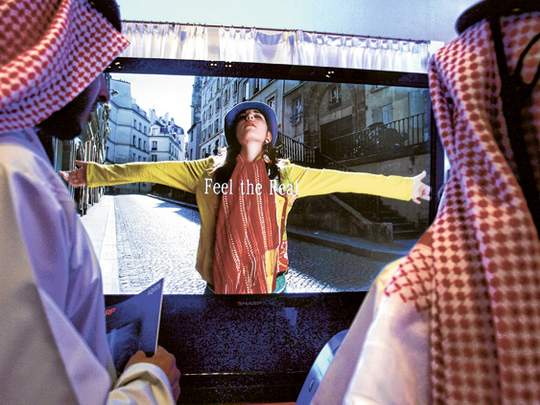
Dubai: Viewers in the UAE now sit in front of two screens to watch television, one for the show and the other to tweet about it.
A total of 60 per cent of those surveyed from the UAE have used a social network or internet chat software to discuss a television programme or video content while they were watching it, according to the findings of a recent Motorola survey, the 2010 Media Engagement Barometer. In the results, the UAE comes in third place after China and Russia.
The UAE was this year included for the first time in the independent study of television consumption habits, which is conducted annually and tracks viewing trends. The online survey is based on 7,500 consumers in 13 markets worldwide.
The findings show that social media which is integrated with television is popular in the UAE and many are willing to pay extra for such a service, said Alper Turken, sales director for the Middle East and Turkey at Motorola Mobility. It's what the survey refers to as ‘social television'.
As Turken explains, social television provides a TV service that is integrated with social networking applications through a TV set.
Networking apps
"A lot of people have said that they would be interested in having a television video service that could integrate social networking applications." The findings have also shown a strong emergence of other screens for TV viewing such as laptops, desktops and mobile devices.
Television, while still the primary viewing device, competes these days with a range of other viewing options. Over half the participants said it's important for them to be able to watch free-to-air and subscription content on a device when they're outside their homes. Fifty-two per cent of the UAE watch TV and video on laptops; 31 per cent on desktops and 13 per cent use either smartphones and/or tablet devices.
These numbers look likely to increase. They show that the UAE is an open market, Turken said.
"The demand we saw in the UAE for the access of TV content through mobile devices is far more than what we saw in the more mature markets. We draw from this that TV is going multi-screen," he said.
Another important trend is the use of recommendation services, which is being able to recommend a specific show or programme to friends and family.
The television viewing experience is evolving to become a more interactive and collective experience, rather than an individual one, Turken said.
According to the survey results, 41 per cent (over double that of the entire survey) would like to see this service, which makes recommendations based on previous viewing and allows the viewer to make recommendations to friends, made available through the TV.
Mobile TV
These findings say much about the future of mobile internet and mobile TV, and show that the consumer is looking for a consistent TV and video experience, available on multiple devices, he said.
"There's a strong message [being sent] to the service providers to evolve their service in this direction," he added. "There's an opportunity for the service providers that is not being captured today.
"Five or six years down the line, mobile TV will become an integral part of our daily life," he added. The companies which are able to really shape future demands will be the ones which capitalise on the substantial opportunities."











